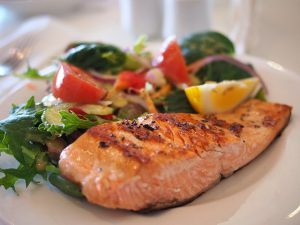I’ve been eating a load of holiday foods and thinking that I’m going to need to make some dietary adjustments. Like me, you may have read or heard in the news that clinical trials looking at omega-3 fatty acids (omega-3 acid ethyl esters – O3AEE) did NOT significantly reduce major cardiovascular events. In fact, the news may have said that two recent clinical trials had failed.
Sometimes, the news media doesn’t take a close enough look at research results! An article reviewing a couple of recent clinical trial results points out that the news media might have got it wrong.
The VITAL Clinical Trial
The first clinical trial that was reviewed, called VITAL, for Vitamin D and Omega-3 Trial, compared four groups of people (totaling 25,000 participants). The first group took one gram of O3AEE per day, the second group took 2000 IU of vitamin D3 per day, the third group took both O3AEE and Vitamin D3 per day and the fourth group took placebos for five years. When there was a comparison of the four groups after five years, there was no difference overall (that is composite) incidence of cancers or major cardiovascular events. BUT, and this is a major BUT, these are not the only results.
There were actually a number of significant results: “28% reduced risk for heart attacks, 50% reduced risk for fatal heart attacks, and 17% reduced risk for total coronary heart disease events,” 1 according to the review. In addition, when people who didn’t eat fish or whose fish intake was low (less than 1.5 servings per week) added the Vitamin D and Omega-3 supplements to their diet, they had a significant 19% reduction in overall incidence of major cardiovascular events. Moreover, “For African Americans, there was a significant 77% reduction in heart attacks in the O3AEE group, a 49% reduction in the need for coronary revascularization, and a 53% reduction in total coronary heart disease.”1
The ASCEND Clinical Trial
A second study, conducted in the UK, looked at over 15,000 people who had diabetes and no cardiovascular disease diagnosis. Half took the same dosage of O3AEE and the other half (placebo) took a capsule containing olive oil. The news media again just reported the overall endpoint, which was not significant for “a composite of risk for nonfatal MI, nonfatal stroke, transient ischemic attacks, and “vascular death” (including fatal CHD, fatal stroke, and death from other “vascular” causes, in other words, CVD death).” Yet they failed to report one important finding: cardiovascular disease death was reduced by 19%.1
Low Intake of Omega-3 Fatty Acids
Unfortunately, intake of omega-3 fatty acids is low in the US, Australia, Canada and much of the European Union. Omega-3 fatty acids are found in oily fish like salmon, herring, anchovies, sardines, and rainbow trout. The authors of this review recommend that people eat at “least one to two fish/seafood servings per week, which is consistent with current dietary guidelines. Following this recommendation would improve omega-3 intake and status in most individuals…”1
However, a final clinical trial discussed in this review article seemed to support doing more than just trying to eat oily fish.
The REDUCE-IT Clinical Trial
A different version of omega-3 “icosapent ethyl (IPE; brand name Vascepa”) was used in this clinical trial. This study compared over 8000 people, half who were taking statins while the other half took statins with omega-3 (IPE version). In this study, the omega-3 fatty acid dosage was upped to 4 grams per day. The results were powerful: people taking both the omega-3 fatty acid and the statin had significantly fewer (by 25%) cardiovascular events, than those taking the statins alone.
In addition to this overall response, the study also found significant reductions in:
- “CV death, heart attack, or stroke in the secondary prevention population: 28% (P < .001)
- CV death or nonfatal heart attack: 26% (P < .001)
- Fatal or nonfatal heart attack: 31% (P < .001)
- Urgent or emergent revascularization: 35% (P < .001)
- CV death: 20% (P < .03)
- Hospitalization or unstable angina: 32% (P < .002)
- Fatal or nonfatal stroke: 28% (P < .01)
- Total mortality, nonfatal heart attack, or nonfatal stroke: 23% (P < .001)”1
The results of this clinical trial, with a higher dosage of omega-3 fatty acids, are impressive. The authors of the review voiced concern that using only the dietary guideline “would likely not be sufficient to reach an intake of 1 g/d of omega-3 fatty acids, a level that provides significant CV benefit for many patients.”1
New Year’s Resolution
So, even though you may have heard in the news that omega-3 fatty acid supplements are not worth it and that fish oil

Image by Gerd Altmann from Pixabay
supplements don’t work, think again. I have. I haven’t been taking my fish oil supplements. And I haven’t been able to eat that much fish every week.
My New Year’s resolution? I’m going back on those fish oil pills. Maybe you would like to join me and increase your intake of omega-3 fatty acids. Consider taking an omega-3 fatty acid supplement for your heart’s sake!
Feature Image by Elias Shariff Falla Mardini from Pixabay








You say, regarding the VITAL trial:
In addition, people who didn’t eat fish or whose fish intake was low (less than 1.5 servings per week) had a significant 19% reduction in overall incidence of major cardiovascular events.
Then, regarding the ASCEND trial, you note:
The authors of this review recommend that people eat at “least one to two fish/seafood servings per week, which is consistent with current dietary guidelines. Following this recommendation would improve omega-3 intake and status in most individuals…”
Do we eat fish or not?
James A.
Yes, eating fish is important. The statement “In addition, people who didn’t eat fish or whose fish intake was low (less than 1.5 serving per week) had a significant (19%) reduction…” has been corrected to be clearer. The study said that, even though they didn’t eat fish, they were taking Omega 3 supplements. And because of the Omega 3 supplementation, even without the fish intake, they had a reduction in overall cardiac events. This result supports the idea of getting Omega 3 in your body, through fish or supplementation.
I am 86 yo and a recent visit to my cardiologist says I am in good shape. I take 3 Krill capsules and 1 vitamin D 5000 unit capsule daily. I will continue to do so.
” In addition, people who didn’t eat fish or whose fish intake was low (less than 1.5 servings per week) had a significant 19% reduction in overall incidence of major cardiovascular events.”
The above sentence from the article indicates NO positive effect from the consumption of fish oil although the rest of the article makes exactly the opposite point.
Can’t someone proofread these articles before they are published.
This is very careless.
To make this sentence clearer, I have added that, when people who didn’t eat fish, added supplements of Vitamin D and Omega 3 to their diet they had a significant (19%) reduction in overall incidence of major cardiovascular events. I apologize if that was unclear in the first version of this post. Thank you for the correction and pointing out that this statement was difficult for some readers. Best, Kathleen
I used to take omega-3 capsules, one a day. I have at present been diagnosed with grade 4 prostate cancer. A few years ago after being diagnosed, I read a paper (unfortunately I don’t remember from where) that taking omega-3 increases the risk of prostate cancer. I obviously stopped taking them. This seems to contradict the recent research or did it concentrate more on the cardio benefits?
Yes, the recent research did concentrate on cardio benefits. Kathleen